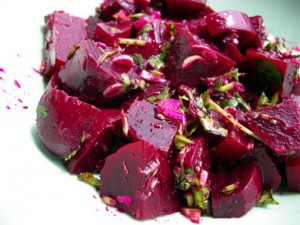Aussies like their beetroot – what North Americans would call beets. They’re plentiful at the markets and I’ve roasted beetroot and shredded it into salad. McDonald’s has a new Aussie lamb burger, and toppings include an egg, onion, lettuce, some sort of goop and beetroot.
The American novelist Tom Robbins wrote an ode to beets in 1984’s Jitterbug Perfume:
“The beet is the most intense of vegetables. The radish, admittedly, is more feverish, but the fire of the radish is a cold fire, the fire of discontent not of passion. Tomatoes are lustly  enough, yet there runs through tomatoes an undercurrent of frivolity. Beets are deadly serious…. The beet is the murderer returned to the scene of the crime. The beet is what happens when the cherry finishes with the carrot. The beet is the ancient ancestor of the autumn moon, bearded, buried, all but fossilized; the dark green sails of the grounded moon-boat stiched with veins of primordial plasma; the kite string that once connected the moon to the Earth now a muddy whisker drilling desperately for rubies.”
enough, yet there runs through tomatoes an undercurrent of frivolity. Beets are deadly serious…. The beet is the murderer returned to the scene of the crime. The beet is what happens when the cherry finishes with the carrot. The beet is the ancient ancestor of the autumn moon, bearded, buried, all but fossilized; the dark green sails of the grounded moon-boat stiched with veins of primordial plasma; the kite string that once connected the moon to the Earth now a muddy whisker drilling desperately for rubies.”
People in Finland may have a different impression of beetroot (I’m sorry, I don’t do impressions).
According to a new paper in Epidemiology and Infection, in 2010, 7/44 (16%) reported foodborne outbreaks in Finland were linked with raw beetroot consumption. In the seven outbreaks, 124 cases among 623 respondents were identified. Consumption of raw beetroot was strongly associated with gastrointestinal illness (relative risk 8·99, 95% confidence interval 6·06–13·35). The illness was characterized by sudden onset of gastrointestinal symptoms; the median incubation time was 40 min and duration of illness 5 h. No common foodborne pathogens or toxins were found in either clinical or beetroot  samples, but all tested beetroot samples were of poor quality according to total bacterial counts. Beta-haemolytic Pseudomonas fluorescens was detected in several beetroot samples but its effect on human health is unknown. No outbreaks were reported after the Finnish Food Safety Authority Evira advised against serving raw beetroot in institutional canteens.
samples, but all tested beetroot samples were of poor quality according to total bacterial counts. Beta-haemolytic Pseudomonas fluorescens was detected in several beetroot samples but its effect on human health is unknown. No outbreaks were reported after the Finnish Food Safety Authority Evira advised against serving raw beetroot in institutional canteens.


.jpg) Church in Wales school.
Church in Wales school..png) surveillance of all notifiable human infectious diseases. Both systems are Internet based.
surveillance of all notifiable human infectious diseases. Both systems are Internet based.  No word whether the barfing was food-induced or not.
No word whether the barfing was food-induced or not. The Serb had just won the third set to take a 2-1 lead and Tsonga looked deflated before Djokovic left Rod Laver Arena after he told chair umpire John Blom he needed to vomit.
The Serb had just won the third set to take a 2-1 lead and Tsonga looked deflated before Djokovic left Rod Laver Arena after he told chair umpire John Blom he needed to vomit.